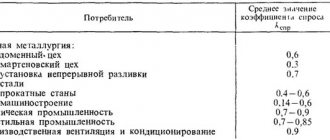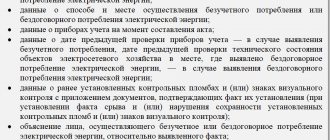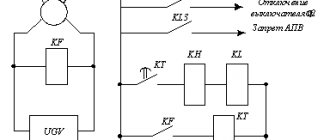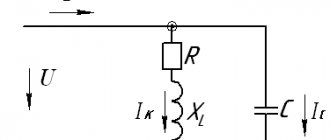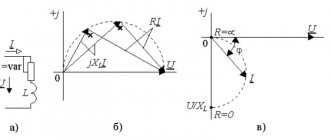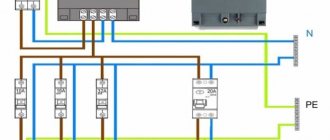Limiting the mode of electrical energy consumption
The procedure for limiting the mode of consumption of electrical energy is established by the Rules for complete and (or) partial limitation of the mode of consumption of electrical energy, approved by Decree of the Government of the Russian Federation of May 4, 2012 No. 442 and the Rules for the provision of utility services to owners and users of premises in apartment buildings and residential buildings, approved by Decree of the Government of the Russian Federation dated May 6, 2011 No. 354.
For citizen-consumers living in individual residential buildings not serviced by management companies, HOAs, housing cooperatives, etc.
Full and (or) partial limitation of the mode of consumption of electrical energy (hereinafter referred to as limitation of the mode of consumption) involves a reduction in consumption volumes or a temporary cessation of the supply of electric energy (power) to the consumer in the event of the occurrence of circumstances stipulated by the current legislation and the energy supply contract.
Partial restriction of the consumption mode is carried out:
- by the consumer independently under the control of the network organization;
- by a network organization if it is technically possible to reduce the volume of electrical energy supplied to the consumer from the power centers of the network organization, in the event of its refusal to independently limit the consumption mode or in the event of emergency restrictions being introduced.
Restrictions on the consumption regime in the event of non-fulfillment or improper fulfillment by a consumer-citizen of his obligations are introduced in the following order:
a) if a citizen-consumer has a debt to pay for electrical energy and (or) services for the transmission of electrical energy, services the provision of which is an integral part of the process of supplying electrical energy to consumers, a partial restriction of the consumption mode is introduced for two billing periods, if there is a need for this technical feasibility. In this case, no less than 15 days before the proposed introduction of such a partial restriction, the initiator of the introduction of the restriction or the network organization (if a restriction on the consumption regime is introduced on its initiative) sends a notification to the citizen-consumer about the planned introduction of a partial restriction on the consumption regime in the event of his failure to repay the resulting debt within a certain period of time. the notice period;
b) if a citizen-consumer has a debt to pay for electrical energy and (or) services for the transmission of electrical energy, services, the provision of which is an integral part of the process of supplying electrical energy to consumers, a complete restriction of the consumption mode is introduced for three billing periods. In this case, no less than 15 days before the proposed introduction of a complete restriction, the initiator of the introduction of the restriction or the network organization (if a restriction on the consumption regime is introduced on its initiative) sends a notification to the citizen-consumer about the planned introduction of a complete restriction on the consumption regime in the event of his failure to repay the resulting debt in full before the expiration of the next payment period, indicating the day, starting from 00 o’clock, this citizen-consumer must introduce a complete restriction of his consumption regime;
c) if the debt is not repaid within the period specified in the notice of the planned introduction of a complete restriction of the consumption regime and the citizen-consumer does not introduce a complete restriction of the regime of his consumption independently, then the executor (sub-executor) introduces a restriction of the consumption regime of such a citizen-consumer from his food center or by disconnecting the consumer's power receiving devices from the electrical network.
The supply of electric energy is restored to the consumer after payment of the debt in full as specified in the written notice of the demand for repayment (payment) of the debt or if the consumer submits documents indicating that he has no debt.
For citizen-consumers living in multi-apartment and individual residential buildings served by management companies, HOAs, housing cooperatives, etc.
When limiting the provision of a utility service, the volume (quantity) of supply of a utility resource to the consumer is temporarily reduced and (or) a schedule for the provision of utility services during the day is introduced.
When the provision of a utility service is suspended, the supply of the corresponding type of utility resource to the consumer is temporarily stopped.
Restriction or suspension of the provision of utility services for electricity supply to citizens-consumers due to their failure to fulfill or improper fulfillment of their obligations is carried out:
without prior notice to the consumer in the following cases:
a) the occurrence or threat of an emergency in the centralized networks of engineering and technical support through which power is supplied, also from the moment of the occurrence or threat of such an emergency;
b) the occurrence of natural disasters and (or) emergency situations, as well as, if necessary, their localization and elimination of consequences, from the moment such situations arise, as well as from the moment such a need arises;
c) identifying the fact of unauthorized connection of the consumer’s intra-apartment equipment to in-house engineering systems or centralized networks of engineering and technical support, from the moment the unauthorized connection is identified;
d) use by the consumer of household machines (devices, equipment), the connection power of which exceeds the maximum permissible loads, calculated based on the technical characteristics of in-house engineering systems and brought to the attention of consumers from the moment the violation is detected;
e) instructions from the body authorized to exercise state control and supervision over the compliance of in-house engineering systems and in-apartment equipment with established requirements, on the need to introduce restrictions or suspensions in the provision of utility services, including instructions from the executive body of the constituent entity of the Russian Federation authorized to exercise state control over quality compliance , the volume and procedure for providing utility services to established requirements, about the unsatisfactory condition of in-house engineering systems (for the technical condition of which the owner of a residential building is responsible) or in-house equipment that threatens an accident or poses a threat to the life and safety of citizens - from the date specified in the document of the relevant authority;
with prior notification to the consumer in case of:
a) incomplete payment by the consumer for a utility service - 30 days after a written warning (notification) of the consumer;
b) carrying out scheduled preventive repairs and maintenance work on centralized networks of engineering support and (or) in-house engineering systems related to the common property of the owners of premises in an apartment building - 10 working days after a written warning (notification) to the consumer.
Underpayment by a consumer of a utility service is understood to mean that the consumer has a debt to pay for one utility service in an amount exceeding the sum of three monthly payment amounts for a utility service, calculated on the basis of the utility service consumption standard, regardless of the presence or absence of an individual or common (apartment) meter and tariff for the corresponding type of utility resource, valid on the day of restriction of the provision of utility services.
In case of incomplete payment by a consumer for a utility service, after a written warning (notification) to the debtor consumer, the provision of utility services to him is limited or suspended in the following order:
a) a warning (notification) is sent to the consumer-debtor in writing that in case of failure to repay the debt for payment of a utility service within 30 days from the date of transmission of the specified warning (notification) to the consumer, the provision of such utility service to him may first be limited, and then suspended or, in the absence of the technical possibility of introducing a restriction, suspended without prior introduction of a restriction. The warning (notification) is brought to the attention of the consumer by handing it over against signature or sending it by registered mail (with a description of the attachment);
b) if the consumer-debtor fails to repay the debt within the period established in the warning (notification), if technically possible, a restriction is introduced on the provision of the utility service specified in the warning (notification) with prior (3 days) written notice to the consumer-debtor by handing him a notice under receipt;
c) in the absence of the technical possibility of introducing a restriction in accordance with subparagraph “b” or in the event of failure to repay the resulting debt and after 30 days from the date of introduction of the restriction on the provision of a utility service, the provision of such a utility service is suspended, with preliminary (3 days in advance) written notice to the debtor consumer by delivering a notice to him against receipt.
The provision of utility services is resumed within two calendar days from the date of elimination of the reasons specified in this paragraph, including from the date of full repayment of the debt or conclusion of an agreement on the procedure for repayment of the debt.
The procedure for limiting energy supply (624-PP)
The main provisions of the new Rules for complete and (or) partial limitation of electrical energy consumption
(approved by Decree of the Government of the Russian Federation dated May 24, 2017 No. 624)
On September 29, 2021, Decree of the Government of the Russian Federation dated May 24, 2017 No. 624 came into force, which amended the Rules for complete and (or) partial restrictions on the mode of consumption of electrical energy, approved by Decree of the Government of the Russian Federation dated May 4, 2012 No. 442 (hereinafter referred to as Resolution No. 624).
These changes were adopted in development of the Federal Law of November 3, 2015 No. 307-FZ “On Amendments to Certain Legislative Acts of the Russian Federation in Connection with Strengthening the Payment Discipline of Consumers of Energy Resources” and pursue the goal of ensuring timely payment for electrical energy and services related to it transfer.
The main changes made to the procedure for introducing restrictions on the mode of consumption of electrical energy are as follows:
- Reducing the time and stages of the procedure for limiting the power supply to the consumer.
The procedure for introducing restrictions is generally reduced to one stage - introducing a complete limitation of electricity consumption. Partial restrictions are introduced only in relation to consumers whose consumption restrictions may lead to economic, environmental or social consequences, and other consumers who have an act of approval of technological and (or) emergency protection. A complete restriction of the consumption mode is introduced by the network organization after a preliminary one-time notification, which reflects comprehensive information about the upcoming restriction (date, time, restriction level, etc.).
- Limit for any amount of debt.
The supplier of last resort has the right to initiate a restriction of power supply to the consumer-debtor in the event of debt formation in any amount, without waiting for its accumulation to a certain level.
- Establishment of the obligation of self-restraint by the consumer.
Resolution No. 624 introduces the obligation of the consumer, upon receipt of the appropriate notification from the initiator, to independently ensure the cessation (reduction) of electricity consumption within the period specified in the notification.
To control self-restriction, the consumer is obliged to allow representatives of the network organization to visit their facilities. Monitoring of consumer self-restriction is carried out no later than 10 days from the date of its introduction and then at least once every 30 days.
- Limitation of “non-switchable” consumers.
In accordance with Resolution No. 624, it has become possible to completely limit the power supply to absolutely all types of consumers, including the limitation of which can lead to economic, environmental or social consequences. Such consumers are disconnected from the power supply after they have taken measures to ensure their readiness for the introduction of complete restrictions.
From the date of entry into force of Government Resolution No. 624, all “non-disconnected consumers” have the obligation to develop and approve an action plan to ensure readiness for the introduction of a complete restriction of the consumption regime.
The period of implementation of measures to ensure readiness for the introduction of a complete restriction of the consumption regime should not exceed 6 months or, if technological and emergency reservations have been agreed upon for the consumer, - 6 months minus the period for reducing power supply to the level of emergency reservation specified in the act of approval of technological and (or ) emergency armor
- Expanding the list of ways to notify consumers.
Resolution No. 624 provides a wider list of ways to notify consumers about the introduction of restrictions on electricity consumption. By agreement of the parties to the agreement, it is possible to use SMS messages, messages to an email address, by including a corresponding notice in the invoice for payment of services, publication in the media, on the official website of the guaranteeing supplier on the Internet and a number of other methods.
The list of email addresses of Mosenergosbyt PJSC intended for sending notifications to debtor consumers about the upcoming introduction of a power supply limitation regime can be found here.
- Limitation of power supply to citizens - consumers.
For citizens who are consumers of electricity (with the exception of citizens who are consumers of utility services for electricity supply), the limitation of electricity consumption is carried out in the same manner and within the same time frame as the limitation of power supply to other consumers. Limitation of the consumption regime in relation to citizens - consumers of utility services for electricity supply is carried out on the grounds and in the manner established by the housing legislation of the Russian Federation.
- Administrative responsibility.
In accordance with Article 9.22 of the Code of the Russian Federation on Administrative Offenses, administrative liability is provided for the consumer (for officials - a fine of 10 to 100 thousand rubles or disqualification for a period of 2 to 3 years, and for legal entities - a fine of 100 to 200 thousand . rub.) for the following violations related to restrictions on the consumption of electrical energy:
- violation of the introduced full or partial restriction of consumption;
- failure to provide access to a representative of a network organization to power receiving devices belonging to the consumer;
- violation of the requirements for drawing up acts of approval of technological and (or) emergency armor;
- failure to implement measures to ensure readiness to introduce a complete restriction of electricity consumption.
failure to comply with the legal requirement of the network organization to independently limit the consumption regime;
More detailed information about the new Rules for complete and (or) partial restrictions on the consumption of electrical energy can be found in the Memo for Consumers developed by the Association of Guaranteed Suppliers and Energy Sales Companies.
The full text of the Decree of the Government of the Russian Federation dated May 24, 2017 No. 624 can be found on the website of the Government of the Russian Federation.
Basic tariff. How much will it cost to limit energy consumption?
This news first appeared in the Kommersant newspaper and instantly spread across all media. Calls began to the government, to the reception offices of Deputy Prime Minister Dmitry Kozak, the Ministry of Economy and the Ministry of Energy, in the depths of which they proposed to revive the old idea of a new tariff for energy consumption.
No one intends to put restrictive devices on meters in apartments and private houses. Consume as much as you like. But such a “device” will inevitably become the family budget.
The proposal does not sound too harmless - the norm will be 300 kW-hours of energy consumed per month from one meter, regardless of the number of residents, and everything higher will be calculated not at the base, but at an increased tariff. If consumption exceeds 500 kW/h per month, then the tariff will become commercial, although it was mildly called “economically justified.”
In other words, the notorious idea of “optimization” wanders from one area of life to another, gradually covering the entire territory of a huge country.
The history of the issue is as follows. Back in 2013, the government hinted at this burning topic, proposing to limit electricity consumption by tariff means, taking the per capita norm as a basis. We decided to experiment and introduced a consumption tariff according to gentle standards (although the question is also very controversial as to how gentle they are) at 50-190 kW/h per month per person. Everything that does not fit must be paid at other rates, much higher. Moreover, the higher the consumption, the higher the tariff.
The pilot project was sent for experimentation to the Oryol, Vladimir, Nizhny Novgorod and Rostov regions, as well as to the Krasnoyarsk and Transbaikal territories. The range of consumption restrictions was set differently: from 50 (in the Vladimir and Nizhny Novgorod regions) to 190 kW/h in the Oryol region. It was believed that each region itself should determine the boundaries of tariffs in order not to affect the vital interests of the majority of the population. How such a discrepancy in norms in almost identical areas was formed is unknown.
The difference in electricity consumption in regions located in the northeastern lands and central Russia is quite understandable. Where the winter is longer, spring and autumn are longer, energy consumption is always greater, which means the population is forced to pay much more. At the same time, the economic standard of living is almost identical everywhere. It is easy to compare electricity consumption, for example, in Krasnoyarsk and Orel. The calendar winter begins and ends the same for everyone, but the real winter is different everywhere. If we add to this the fact that year to year is different - then spring will come earlier with saving warmth, then the fierce winter will drag on right up to June - and the picture becomes especially dramatic.
Photo source: RIA Novosti
The experiment was supposed to become a federal norm in the summer of 2014. However, growing social tension, caused, among other things, by these “laboratory” experiments, convinced the government to postpone the adoption of the law for two years, and then completely shelve it. But, apparently, do not forget.
The current proposal of the two competent ministries, approved at this stage by Deputy Prime Minister Dmitry Kozak, has been submitted for examination to the Federal Antimonopoly Service (FAS) until mid-January 2021. After discussing the provisions of the project with the Ministry of Economy and the Ministry of Energy (the initiators of the “innovation”), the final certificate and regulatory documents will go to the table of the Deputy Prime Minister, and then the Prime Minister. However, the FAS has already reported that the average rate of human electricity consumption in the country is 89 kW/h per month. This is supposedly enough in regions where the real and calendar winter, if not the same, are close to each other. But, for example, in Transbaikalia or the Krasnoyarsk Territory this is far from the case. The FAS has not yet said a word about this.
The new proposal is considered softer than the old one, because the previous one was calculated per capita, that is, on the number of family members living under one meter, and the current one introduces a general standard - the mentioned 300 kW/h per month for everyone at once, that is, as stated in project, “to the connection point”. Moreover, the government believes that most households will meet the social norm.
The FAS is already citing a certain Crimean experience, which seems to have confirmed this optimal norm. However, Crimea is a warm south with a special climate and a short duration of the cold season. The same thing is in Sochi or Novorossiysk and Gelendzhik, on the Azov coast, in the Krasnodar Territory or in Rostov-on-Don. Consumption standards in a huge country are different everywhere. After all, there is the Far North, the Far East, the Urals, and vast Siberia. Climatically, all this suggests a wide variety.
In the project, which has already been put on the table of the government, it is proposed to deprive those who live in rural areas, in private houses, and those who live in apartments without gas equipment, but have electric stoves and electric heating devices everywhere, that is, the room is heated only using current. This also happens in the suburbs, in private homes. Whatever they are called - rural areas or urban-type settlements. And there are more and more of them - developed villages are separated administratively from large regional centers, being only part of their management structure.
Regarding the increase in non-standard electricity tariffs, timid voices have already been heard that this action is taking place in a secret conspiracy of electricity producers and gas workers. Its goal is supposedly to force the majority of the population of urban settlements and villages to pay at monstrous tariffs for the main gasification of households (discharge from a common pipe to the threshold of their own home), as this will save expensive electricity in everyday life and, most importantly, in seasonal heating of houses. Is this why Dmitry Kozak sent the project to the FAS? Will such a scandalous hypothesis be considered there?
For example, in the Moscow region, a considerable number of so-called townhouses for two or more families with a separate entrance and a piece of land are being built. They turned out to be very popular because, firstly, they make the life of every family on earth independent, and secondly, they are economical and prestigious. In short, this is a long-standing European and American standard for the middle class. If there is only one electricity meter installed for the entire complex, and each sector is home to a different number of people, then the total costs of the new tariff will be prohibitive.
Photo source: RIA Novosti
Let's say a couple of pensioners live in one wing, and a young family with two or three children lives in the other. Electricity costs are different, but there is only one meter - that is, the same “connection point”. Not everyone will be able to agree on differentiated payment. You can already predict a lot of conflicts, including the sale of part of the house. This will inevitably affect the already unstable prices for such buildings. As a result of all this, the project itself for the construction of townhouses, which is rightfully proud of in the rapidly developing Moscow region, will be under threat. It seems that only companies engaged in the construction of apartment buildings with meters at each “family” door will benefit. Thus, all the beneficiaries of the project of the two ministries become visible even to the eye not armed with special knowledge and experience.
Will the FAS take this into account, will they ask governors about the advisability of a restrictive policy regarding electricity consumption by the population? Will loopholes for social benefits be left or even old ones will be closed?
Rumor has it that subsidies will be introduced for a certain category of insolvent citizens. But the trouble is that, as a result of such tariffs, an increasing number of people will fall into this category. Or will they not be registered on such a social scale? This is quite possible, since this has already happened more than once over the past years. Those who did not manage to jump on the bandwagon in time were left at the stop. And there won't be another train.
The tariffs for the new project have not yet been specified. Perhaps it will indeed be acceptable for the majority of the population, but only subject to benefits and the possibility of separating some households from others in townhouses. Nowadays this is almost impossible if two apartments are separated by one wall, rather than two with little space between them.
Experience shows that electricity consumption of 300 kW/h per month per meter in an unstable climate, even in the Moscow region, which is more or less prosperous in all respects, is not enough. The actual figures are significantly higher. And not only in private houses, but also in apartments where there are electric stoves, not gas water heaters, where every turn on of the water is actual consumption of electricity, where children grow up who need warmth, just like adults, where the duration of daylight hours is nine months there are fewer nights in a year, which means the light bulbs turn on earlier. The operation of every household appliance involves electricity - from a computer and TV to a dishwasher, iron and refrigerator. And in private houses - long-term operation of gas boilers. After all, they not only warm, but also provide the house with warm water, without which it is impossible to imagine modern life.
So the submission of draft regulatory documents by January 15, 2019 leaves almost no time for reflection. And this is the main thing - to think, and not just count. There are social and even just everyday values that cannot be calculated even by the most optimal mathematical calculations.
Andrey Binev, journalist, analyst
Power control device
Let's assume we mean a three-phase connection. At a voltage of 0.22 kV, we get 5.5 kW, from all three phases we have 16.5 kW (am I thinking correctly? I’m a lawyer, from technical education I only have the Criminal Procedure Code, I remember physics from school, but not thoroughly). Plus or minus close to 15 kW. Do you mean whether such machines fit the definition of a 15 kW control device? I do not think. But I’ve come across opinions online that it’s quite suitable. Moreover, networkers also said this (the information is not direct, but from third hands, according to messages on forums) - some small and marginal ones, judging by the descriptions. And consumers are very greedy. Who tried to save in such an ambiguous way (not realizing that they were limiting themselves - when the load is skewed across phases, they cannot select the entire power of 15 kW, but are forced to settle for less power). Why I don’t think so is because the control device must be transparent and understandable in its action for the consumer. Plus, it should be informative for the network organization - since it is they who need to know that the consumer exceeds the maximum power.
The machine doesn't do this. Why did he disconnect? Who knows, maybe there is a short circuit, or maybe the load is too high, or maybe the machine is faulty. My case is an example of the third option: two automatic machines of the same brand in the apartment panel in turn, with a difference of 2 months, failed. This was expressed in shutdown, regardless of what and how it was connected to them at the output. You turn it on and it turns off immediately. There was almost no load, and then I removed it altogether, the short circuit is not visible, but you never know. An electrician finally found out the cause.
For the consumer, turning off the machine is, accordingly, not very informative (and as an incentive to eliminate violations, it is not very effective). After turning off, the consumer will simply turn on the machine and continue working (at most, before turning it on, he will inspect the devices to see if anything has burned out). Maybe it will catch the shutdown again, and then turn the machine on again. Only after several repeated shutdowns of the machine, if a short circuit is not detected, can it dawn on the consumer that something is wrong with the load on the phase. Or maybe it won’t dawn even then.
And the network organization will not know anything at all about the facts of the machine being turned off. For her, a violator and a decent and law-abiding consumer are in no way different. True, even here one can argue whether there is a violation? After all, the machine stupidly does not allow you to violate it. Just when you were about to exceed the power, he did it! - and cuts off the load. So, what difference does it make whether you don’t violate it voluntarily or forcedly, anyway, you haven’t become a violator. That is, for the network organization, when considered in this way, there should be no difference whether there were outages or there were none (after all, a violation did not happen one way or another).
There is another point - some network operators require sealing, or they seal it without asking - either the machines themselves (requiring them to be installed in a separate casing) or the entire box with the panel (including the metering device, all connections, current transformers (if any), and of course , automatic machines). As if to avoid extraneous connections in addition to the meter (to the terminals of the machine). And to avoid unauthorized replacement with a machine of a higher rating (which is logical if we consider them as a power control device). If the rating of the machine is not chosen with a reserve, but close to the maximum power, then this is fraught, because it increases the likelihood that at some moments the machine will work. How then will the consumer object be included back? Independently by the consumer with breaking seals? You can get unregistered. Or do we need to call the network people to turn it on themselves? If they come, it’s unlikely to be soon (this is a violator, there is a temptation to stall for time and thereby teach a lesson, and on the other hand, the case is not urgent, and even if there really is no intention to ruin the life of the consumer, then he will still be in the queue for departures last).
So machines as control devices are bad for everyone, and first of all for the consumer. The network organization either knows nothing about the excesses (if the consumer has not sealed the machines and turns them back on), or finds out about them, but at the same time becomes confused, because you need to go to each violation and turn back the disconnected machines (if you have sealed them). The consumer is either forced to constantly turn on the machines, or even worse, is forced to wait for the network to turn them on. And he must also figure out in each case of shutdown what the reason is.
It is more or less normal for him only if the network organization forced him to install an automatic machine as a power control device and of a certain rating, close to the maximum power; but then she calmed down on this, didn’t seal anything and doesn’t follow it anymore. The consumer thereby saved money (he does not need to spend money on an expensive separate device or on an expensive version of the meter, and he would have installed the machine anyway, not even as a power control device, but to protect his equipment). And if a shutdown happened, it’s okay, I turned it back on myself. Or even exchanged it for an automatic machine of a higher denomination without any restrictions.
Question: The chairman of the HOA claims that the shopping pavilion that I own is illegally connected to the power grid (input distribution device - “IDU”), since the recently created HOA did not give consent to the connection. And besides, the technical conditions for connection (technological connection) were previously issued to the previous owner of the pavilion, and not to me.
Currently, I have a direct contract with the energy supply organization (guarantee supplier), the technical conditions for connection were fulfilled at one time (by the previous owner).
Does the HOA, as the owner of the electrical grid facility, have the right to limit the consumption of electrical energy, i.e. just turn off my electricity?
Answer:
Grounds for limiting the mode of electrical energy consumption
On June 12, 2012, Decree of the Government of the Russian Federation dated May 4, 2012 N 442 “On the functioning of retail electricity markets, complete and (or) partial restrictions on the consumption of electrical energy” came into force (together with the “Basic provisions for the functioning of retail electricity markets”, “ Rules for complete and (or) partial limitation of the mode of consumption of electrical energy").
The said Government Resolution provides an exhaustive list of grounds for limiting (full or partial) the mode of consumption of electrical energy, among which there is no such as “change of the method of managing an apartment building”, “change of the owner of the energy receiving device, as well as the power grid facility”, “change of the guaranteeing supplier” .
Who has the right to initiate restrictions on electrical energy consumption?
Decree of the Government of the Russian Federation dated May 4, 2012 N 442 regulates not only the procedure for limiting the mode of electricity consumption, but also names the initiators and implementers of this measure.
According to clause 4 of the Rules for complete and (or) partial limitation of the mode of consumption of electrical energy, approved. Government Decree No. 442, restrictions on the consumption regime are introduced:
- at the initiative of the guaranteeing supplier (energy sales, energy supply organization, producer of electrical energy (power) in the retail market);
- on the initiative of organizing the commercial infrastructure of the wholesale market;
- at the initiative of a network organization providing services for the transmission of electrical energy;
- on the basis of an order from the state energy supervision body on the need to introduce restrictions on the consumption regime;
- at the request of a consumer who does not have the technical ability to introduce a restriction on the consumption mode on his own, to introduce a restriction on the consumption mode in his regard, sent to the guaranteeing supplier.
Another owner of electric grid facilities, which is the Homeowners Association, is not indicated as a possible initiator who has the right to fully limit the consumption of electrical energy (see “Illegal power outage to consumers of HOAs, SNT, UK. Judicial practice”).
Return to the beginning of the review: “Disconnection of electricity to a consumer who has a direct agreement with the energy supplier,” containing articles:
- “Who has the right to limit the mode of electricity consumption, turn off the electricity?”;
- “repeated technological connection to power grids upon change of owner”;
- “Illegal power outage to consumers of HOAs, SNTs, and management companies. Arbitrage practice"
- and other materials)

